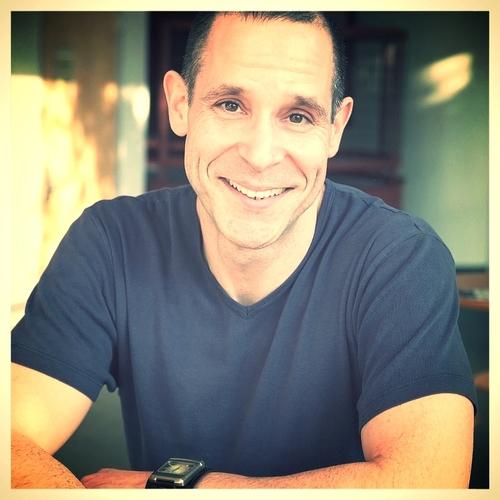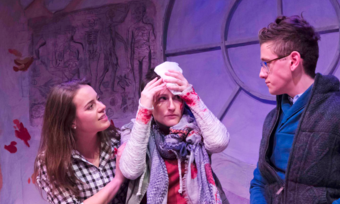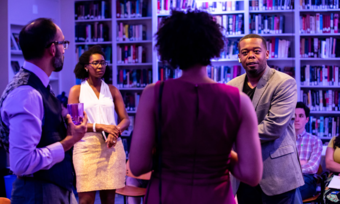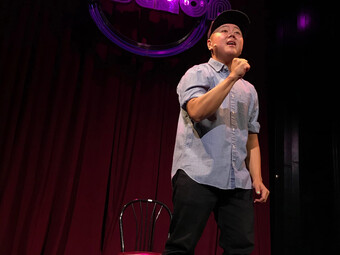The Value of Collaboration
Shortly after my play The Children premiered this past spring at The Theatre @ Boston Court, an incredible thing happened: I got a job copywriting. Thirty hours a week. A permanent writing gig I could count on, and one that would afford me less financial worry so that I could be a playwright who doesn’t stress about making ends meet. No more stringing together teaching gigs and commissions and odd jobs to make a steady income. The last time I felt that good? When I got a call from Boston Court saying they wanted to produce the world premiere of my play.
We hear it a lot about playwriting—that there’s no money in it. Whether or not that’s actually true, I had the opportunity to talk about this issue recently when I met with a young playwright, a senior at Northwestern University’s Creative Writing for the Media Program, who wanted to pick my brain about how I’ve managed to make it as a career playwright.
But first: let’s try and define make it. I, like a lot of playwrights, struggle. I struggle to write, and to write well. I struggle to get productions, workshops, grants, commissions, and more. Like hundreds of other playwrights, I spend days putting together applications to get into conferences, festivals, and residencies. And, like hundreds of other playwrights, I receive many more rejection letters than congratulatory calls.
Second: let’s define career. If you mean a reliable paycheck—nope (see above). If you mean health benefits or financial security—not a chance. If you mean a profession that steadily moves forward, increasing in stature and scope and visibility… possibly… depends… could happen one day. As writers, so much is out of our control.
In 2010, New York magazine ran a brief piece on Bruce Norris (and his then-new play Clybourne Park) that’s always haunted me. To this day, I remember it vividly thanks to the number $19,000. This was how much Mr. Norris said he earned the year before. Earned. All year. This, from an acclaimed and brilliant writer, who’s had plays produced across the world. To me, this announcement was not only a brave thing to declare publicly, it was a revelation. After Todd London and Ben Pesner’s incredibly insightful Outrageous Fortune, David Dower’s years of field study… there it was again, in bold print. In New York magazine. A monetary truth exposed.

To this day, I remember it vividly thanks to the number $19,000. This was how much Mr. Norris said he earned the year before. Earned. All year. This, from an acclaimed and brilliant writer, who’s had plays produced across the world.
It is indeed the rare playwright who gets to announce playwriting as a job, a real-life, full-time gig.
And I know this, I do. I knew it going into this field. And still, when this Northwestern student sincerely asked me “Is it worth it?” I found myself nostalgic for the days when I used to immediately answer that question with an unqualified, urgent, booming Yes. But these days, with a kid and a husband and responsibilities and more, my answer has grown in complexity. And, especially with young playwrights, I want to share open and honestly about where I am today with this notion of worth—of value.
Half of the time, and especially in a country where The Arts (and arts programs) are in a constant struggle for survival, my belief that the value of art trumps the value of cash remains unshaken. But then, the other half of the time, when the mail comes in and my school loans are due or my son needs a filling that isn’t covered by insurance…well, that’s where things get complicated. At what cost are we choosing to live the lives of playwrights? Or artists?
“Is playwriting worth it?” My answer to this student was: financially? For where I am today, right now? No. But… in almost every other aspect: yes. Playwriting is worth it. But why? With the amount of energy I spend on writing, the time away from my family, the funds I shell out to attend readings and workshops in other states with no guarantee of production, no guarantee that if I do get a production another one’s coming along, what is the value of playwriting? Or better yet, what can’t I put a price on?
For me, it turns out the answer is collaboration. Or more specifically: a collaboration that works. The experience that I had working with director Jessica Kubzansky and dramaturg Emilie Beck on The Children couldn’t be measured in dollar signs. I was fortunate enough to work with two artists who attacked the play with great care and sensitivity, who asked incisive questions, who challenged my every line but never lost sight of the origins of the play’s beating heart. When collaboration works, you leap together. You dig together. You forgive together. When collaboration works, you learn to become a better artist, communicator, listener, leader, and follower.
Here’s a good example. Two weeks before the play’s first rehearsal, Jessica and Emilie and I were still struggling with one character who wasn’t as clearly defined as the others. Over dinner, we tossed out ideas about why this was, but none of them really got to the crux of the matter. One of them asked me what my intent with the character was, and I explained that I wanted him to be a mystery, an enigma.
When collaboration works, you leap together. You dig together. You forgive together. When collaboration works, you learn to become a better artist, communicator, listener, leader, and follower.
They correctly pointed out that a mystery, without an answer behind it, is hard to play. Vagueness and cleverness can be a writer’s trick, and they challenged me to get specific and clear. But I struggled to come up with a quick answer. So I just started talking. I shared that, as a gay man who grew up without a father, I would find ways to parent myself, talk to myself. When I felt low or insecure and needed someone to pull me through, I subconsciously imagined this guy, living inside of me, who was there for support. You might call him a conscience, or a superego. All I know is, there has always been this iconic male figure in my life: he is a lover, a therapist, a father, a brother, a buddy, a sheriff. He is an ideal male, and he is anybody I need him to be.
“Oh, he’s a shapeshifter,” said either Emilie or Jessica, I forget which one. But it’s true—that’s exactly who this character is—and who he turned out to be when I went home that night and pointedly rewrote him as such. And this new delineation made all the difference.
How many other professions make this kind of deeply personal exchange possible? Where the work includes sharing who you are and why you are? And that was just one personal story. Throughout the whole course of the rehearsal process, Emilie and Jessica, as well as the actors and designers, shared their own intimate stories and beliefs. And how do you place a value on that? Can you put a price on that conversation? That dialogue? That sharing of your core identity in pursuit of a common purpose and goal?
Collaborators build something together. We hear the phrase “the theatre community” used often. And that’s what this collaboration built for me. A community. A home—for myself, for my play, for ideas and emotions and a mission. These are all things I greatly value—it’s what I hold dear.
Here’s what I want to say about the money part: wherever we go, we pay for the privilege of community. Governments have taxes. Clubs have fees. Religious organizations have tithes. It’s not exactly analogous, but maybe playwriting is like Social Security. It’s something you will always pay into because it provides you a social safety net. You contribute—with money and time and sacrifice—to a community of artists who shore you up, challenge your evolution, and provide you a place in the world. In this instance, the word value can literally mean a bargain.











Comments
The article is just the start of the conversation—we want to know what you think about this subject, too! HowlRound is a space for knowledge-sharing, and we welcome spirited, thoughtful, and on-topic dialogue. Find our full comments policy here
Days in the trenches of playwriting can be brutal - but reading this article was an inspiring tonic!
I think often of the word “collaboration,” along with its
partner “ensemble.” In our work at Fort Point Theatre Channel, we say our
productions are created collaboratively and that we operate as an ensemble of
artists. Sound familiar? Isn’t almost all theatre work collaborative, except
for the rare solo, self-directed performer? Isn’t almost every cast an ensemble
(or should be)? So when I use those lovely words, I wonder about the content
behind those words. What can we do to put substance into them? Guidance
appreciated, even of the sort “It’s collaborative if….” “It’s not ensemble if…”
On the positive side, in our most recent production, playwright, designers, and
actors came together periodically over several months to workshop a new script,
develop the production concept, and just plain brainstorm. The result was still
the product of the playwright genius, but the production truly felt the product
of everyone’s ideas, and all the better for it. The most important things were
bringing everyone to the table early, and everyone being open to the many ideas
that emerged. Some people came not knowing if their work would even fit in the
end. For example, a choreographer took part, and dance was central to the
production; a filmmaker also took part, although in the end we all agreed film/video
would not add to the production. We’d love to repeat that process and plan to,
yet it is challenging: how many set designers, for example, can make a living
if they spend six months focused on one job, let alone bringing all the
designers, playwright, director, and others who might not even be part of the
production together even once a month?
Thank you for speaking with such openness and honesty. I'm currently a student playwright and director having the same discussion in my head on a daily basis, and while I've fully accepted that I'm not going to have a full-time freelance "career" in theatre for many years, to hear you discuss firsthand the irreplaceable joys and benefits from being a part of the professional community was exactly what I needed.
Gorgeous, Michael. I'm with you.
Very well said... I particularly like the reality info about playwriting in the early part... more people/students/non-artists need to know this about so many arts. I personally find the swinging back and forth between making money and then not, challenging - in the early stages I thought, great! I made it now, i have my (fill in the blank famous newspaper) review and a grand pay check, finally! as if from then on in it would always continue this way. Really it is up and down for most artists all the time. I find I respect those who keep working; even artists whose work I didn't like the first time I see it- if they manage to stick to it - I start to look more carefully. If they can hang in there through the long haul, even if i don't get it... I will try, because I know how hard it is to keep working, past the first mortgage, past the 40th birthday... and those who make it past 50 should all get some kind of award for pure sticktoitiveness. www.batdorf.org